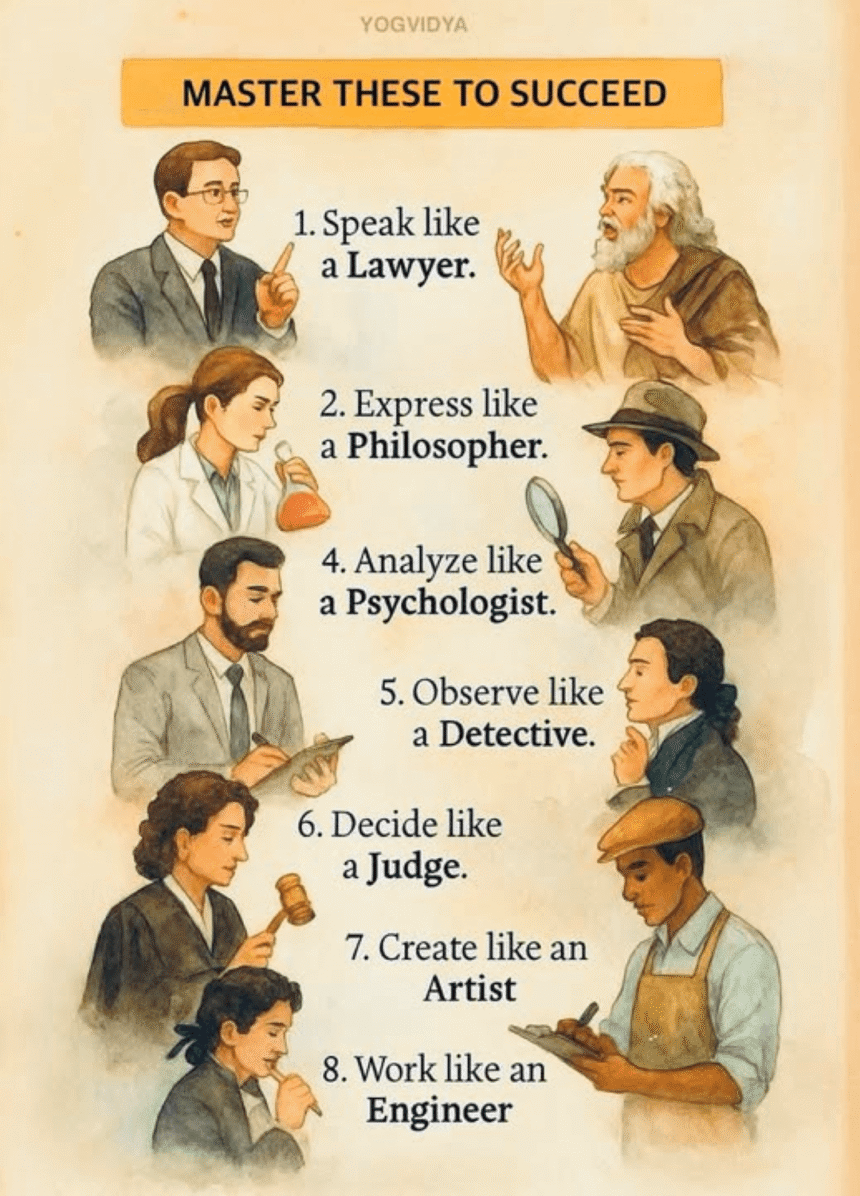Updated on July 26, 2025
In today’s competitive world, having degrees or experience alone is no longer enough—you need to develop the essential skills for success that truly make a difference. This blog explores powerful, timeless habits like speaking with clarity, thinking deeply, analysing behaviour, and making wise decisions. These skills are not tied to any single profession—they are universal abilities that help you stand out in every area of life. Whether you’re a student, a working professional, or someone on a personal growth journey, mastering these skills can transform how you communicate, lead, solve problems, and achieve your goals.
Mastering the Essential Skills for Success
Success in real life is shaped by how well you think, communicate, observe, decide, and create. These abilities form the essential skills for success that every individual—regardless of profession—should aim to master. They’re not just helpful in the workplace; they improve how you interact with others, solve problems, and respond to life’s challenges. By learning to speak like a lawyer, express like a philosopher, analyse like a psychologist, observe like a detective, decide like a judge, create like an artist, and work like an engineer, you prepare yourself to handle any situation with confidence and competence. Let’s explore how each of these skills can transform your journey to success, with relatable examples and easy tips to start developing them today.
7 Essential Skills for Success

1. Speak Like a Lawyer
Lawyers speak with clarity, logic, and precision. They present facts, structure their arguments, and remain calm under pressure. This skill is not just for courtrooms—it’s invaluable in meetings, presentations, and daily communication.

✅ Example: Instead of saying, “I don’t agree with that,” say, “Based on the data we’ve reviewed, an alternative approach might be more effective because…”
🎯 Tip: Learn to organise your points: What, Why, and How. Practice speaking slowly and clearly with purpose.
2. Express Like a Philosopher
Philosophers think deeply and express with meaning. They don’t just state opinions—they explore perspectives, ask questions, and challenge assumptions.
✅ Example: When facing a disagreement, rather than reacting emotionally, say, “What could be another way to understand this situation?”
🎯 Tip: Read thinkers like Socrates or Marcus Aurelius. Practice journaling your thoughts to become more mindful in expression.
3. Analyse Like a Psychologist
A psychologist observes human behaviour, identifies patterns, and understands emotional triggers. This skill is vital in understanding your own decisions and others’ reactions.

✅ Example: In leadership, instead of reacting to a team member’s mistake, pause and consider what stress or pressure may be affecting them.
🎯 Tip: Practice empathy. Ask: “Why might someone behave this way?” Understanding motivation helps you respond wisely.
4. Observe Like a Detective
Detectives are trained to notice what others miss. They pay attention to detail, body language, and surroundings. Observation leads to better judgment and decision-making.
✅ Example: In a team meeting, a good observer might notice who’s hesitant to speak and later approach them privately to ensure inclusion.
🎯 Tip: Practice mindful observation. Spend 10 minutes a day just watching people or your environment, noting small details.
5. Decide Like a Judge
A judge weighs evidence, listens actively, and makes fair decisions. This is a powerful skill in life and leadership, especially when emotions are high or choices are complex.

✅ Example: When resolving a conflict between two colleagues, don’t take sides quickly. Listen fully, ask questions, then make a decision based on facts, not feelings.
🎯 Tip: Write down pros and cons. Step back emotionally before making decisions, and always seek fairness and clarity.
6. Create Like an Artist
Artists think differently. They imagine, innovate, and bring beauty to the world. Whether you’re designing a product or writing a proposal, creativity adds value.
✅ Example: A business owner could design a brochure not just to inform, but to emotionally connect with the audience through story and visuals.
🎯 Tip: Don’t be afraid to brainstorm wild ideas. Give yourself time to play, sketch, doodle, or create without pressure.
7. Work Like an Engineer
Engineers are known for systematic thinking, precision, and practical solutions. They break down complex problems and build efficient systems.
✅ Example: When managing a project, use an engineer’s approach—set goals, define milestones, troubleshoot risks, and track progress.
🎯 Tip: Use tools like flowcharts, checklists, and project trackers. Always ask: “How can this be done more efficiently?”
Conclusion
Success doesn’t come from one magical trait—it’s a combination of essential skills for success developed intentionally over time. Learn to speak like a lawyer, think like a philosopher, analyse like a psychologist, observe like a detective, decide like a judge, create like an artist, and work like an engineer. Each of these roles offers a unique perspective and strength. Mastering them can shape you into a wiser, more effective, and well-rounded individual in both personal and professional life.
Which of these essential skills for success do you already practice—and which one will you start mastering today?
5 FAQ – Essential Skills for Success
1. Why are these particular skills essential for success?
These skills mirror how successful people think and operate. They combine logical thinking, emotional intelligence, and creativity—qualities needed for balanced decision-making and growth.
2. Can I learn these skills without formal education?
Absolutely. These are life skills you can learn through observation, reading, practice, and reflection. Books, videos, mentors, and experience are powerful teachers.
3. How can I practice speaking like a lawyer in daily life?
Start by organising your thoughts before speaking. Avoid filler words, focus on clarity, and support your statements with reasoning or evidence.
4. What is the benefit of observing like a detective?
It helps you make better judgments, notice opportunities others miss, and prevent misunderstandings by reading non-verbal cues.
5. How can I work like an engineer without being one?
Apply their problem-solving mindset: plan, break complex tasks into parts, and always think in terms of solutions and systems.
Thank you for taking the time to explore this post. I hope you found it both insightful and enjoyable.
Remember, your sharing can make a positive impact! Please share this post across your social media and other networks, allowing others to benefit from its content.
PVM
References and image credits: Yogvidya

Mathukutty P. V. is the founder of Simply Life Tips, a blogger, content writer, influencer, and YouTuber passionate about learning and sharing. Guided by “Simple Living, Creative Thinking,” he believes in the power of knowledge sharing and lifelong learning.
Related
Discover more from Simply Life Tips
Subscribe to get the latest posts sent to your email.







